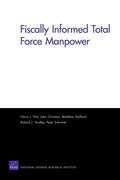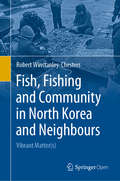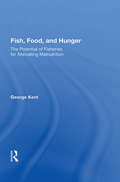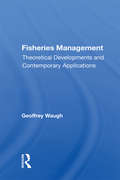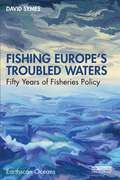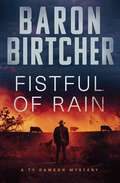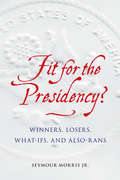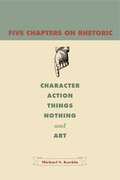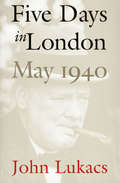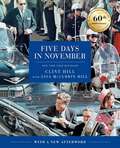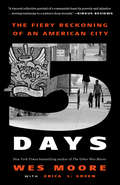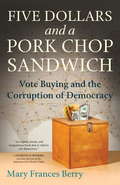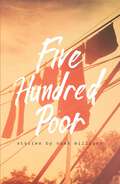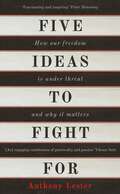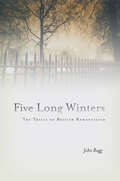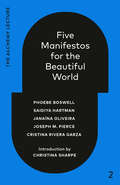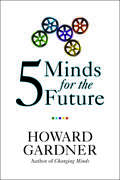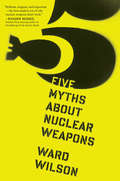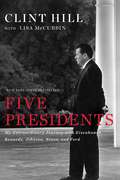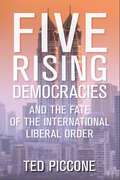- Table View
- List View
Fiscal Vulnerability and Sustainability in Oil-Producing Sub-Saharan African Countries
by Robert York Zaijin ZhanA report from the International Monetary Fund.
Fiscal and Macroeconomic Impact of Privatization
by Steven Barnett Jeffrey Davis Rolando Ossowski Thomas RichardsonA paper reviewing fiscal and macroeconomic issues in the privatisation of non-financial public enterprises in developing and transition economies.
Fiscal and Monetary Anchors for Price Stability: Evidence from Sub-Saharan Africa
by Alfredo Baldini Marcos Poplawski RibeiroA report from the International Monetary Fund.
Fiscally Informed Total Force Manpower
by Harry J. Thie John Christian Peter Schirmer Matthew Stafford Roland J. YardleyPresents the results of a short-term review of 27 publicly available manpower studies to discover methods that other organizations could use to make "fiscally informed" manpower decisions. The studies exhibit varying methods for determining manpower requirements; however, the method used may not be as important as other attributes, such as the direct involvement of a senior decisionmaker.
Fish, Fishing and Community in North Korea and Neighbours: Vibrant Matter(s)
by Robert Winstanley-ChestersThis open access book explores the histories and geographies of fishing in North Korea and the surrounding nations. With the ideological and environmental history of North Korea in mind, the book examines the complex interactions between local communities, fish themselves, wider ecosystems and the politics of Pyongyang through the lens of critical geography, fisheries statistics and management science as well as North Korean and more generally Korean and East Asian studies. There is increasing global interest in North Korea, its politics, people and landscapes, and as such, this book describes encounters with North Korean fishing communities, as well as unusual moments in the field in the People’s Republic of China, the Russian Federation and the Republic of Korea (South Korea). It addresses fish, fishing infrastructure, fishing science and fishing statistics and other non-human elements of North Korean and other nations’ developmental regimes as actors and participants within them as much as humans and their technologies. The book enables readers to gain extensive insights into the aspirations and practices of fishing in North Korea and its neighbours, the navigation of difficult political and developmental situations and changing ecological realities in a time of environmental and climate crisis familiar to many across the globe.
Fish, Food, And Hunger: The Potential Of Fisheries For Alleviating Malnutrition
by George KentThis book provides descriptive information on fisheries and nutrition, and outlines actions that could be taken to enhance the contribution of fisheries to the alleviation of malnutrition. It derives generalizations regarding the evaluation and design of fisheries projects and fisheries policies. .
Fisheries Management: Theoretical Developments And Contemporary Applications
by Geoffrey WaughAmong the problems of the modern fisheries industry is the persistent trend toward the severe depletion of fish stocks, resulting in low catch rates and poor economic returns, along with unnecessary accumulations of capital investments. Dr. Waugh argues that these problems call for effective management procedures based on bioeconomic modelling, which integrates the population dynamics of fish resources with the economic processes of harvesting and marketing. Assessing developments in bioeconomic theory, Dr. Waugh discusses why recent advances have not been fully translated into improvements in the management of marine fisheries. He cites the difficulties of reaching a consensus concerning suitable objectives for fisheries management, as well as the problems of designing a regulatory framework to improve the operation of the industry. To illustrate the utility of bioeconomic modelling, Dr. Waugh presents case studies of two Australian fisheries. A dynamic, stochastic, numeric model is developed for the Exmouth Gulf Prawn Fishery to provide insights into the optimal exploitation of a yearly resource, where fluctuations in recruitment, natural mortality, and catchability are important. The study of the New South Wales Abalone Fishery highlights the difficulties of obtaining the necessary overview of a fishery and the problems in collecting the data required for modelling and management.
Fishing Europe's Troubled Waters: Fifty Years of Fisheries Policy (Earthscan Oceans)
by David SymesSpanning the last 50 years of fisheries policy in Europe, this book is the parting contribution and career-spanning reflection from one of Europe’s most renowned social scientists working in the field of fisheries management and policy. The last 50 years have without doubt been the most turbulent years in the history of North Atlantic fisheries – a turbulence brought about by the actions of fishers, scientists and above all politicians. It is a period of change that sees a radical redrawing of the political geography of fisheries, globalisation of trade, the development of fisheries management towards increasingly restrictive regulation, and declining fish stocks. The book explains why the bold but deeply flawed Common Fisheries Policy persistently failed to deliver its basic goal of sustainable fisheries. The spotlight falls on the monolithic, highly centralised, command and control nature of the Policy that strives to apply a universal ‘one size fits all’ approach, thus creating a governing system wholly unsuited to the system to be governed, out of kilter with preferred models of governance, and disconnected from the practical realities of fishing as a livelihood in a challenging environment. A final section on Brexit focuses on its halting progress from concept to reality, the implications for the fisheries sector and the fateful final negotiations with the EU over the fisheries question. Seeking to explain why the anticipated benefits for the UK industry failed to materialise, attention is drawn to the misplaced political hubris over regaining ‘sovereignty’ in areas like the North Sea. This book will be essential reading for students, scholars, professionals and policymakers working on fisheries, marine governance, natural resource management, environmental policy and the European Project.
Fission and Fusion of Allies: The ROK Nuclear Quest and U.S.–France Competition and Cooperation
by Jooyoung Lee Lyong ChoiThis book traces the development of U.S-led global nuclear non-proliferation diplomacy during the three decades since the Eisenhower’s “Atoms for Peace” in 1953. The U.S. non-proliferation efforts had diverse obstacles. It had to prevent nuclear states’ export of nuclear technology while dissuading non-nuclear states from developing nuclear weapons. In addition, building non-proliferation regime was not always its top foreign policy priority. To understand the complex process of non-proliferation, the book examines the relations among three different actors in the nuclear field: a global non-proliferation regime builder (U.S.), a potential nuclear proliferator (France) and a would-be nuclear state (Republic of Korea). In tracing how they developed nuclear strategies, conflicting and compromising with one another, the book pays special attention to how the transforming Cold War structure in the 1970s not only affected foreign policies of the involved countries but also complicated their relationship. The exploration ultimately highlights the multidimensional nature of international discussion on nuclear non-proliferation as the ROK’s nuclear development attempts, U.S. non-proliferation efforts, and the U.S.-France nuclear technology cooperation in the 1970s were all deeply connected.
Fistful of Rain (The Ty Dawson Mysteries)
by Baron BirtcherThe second Sheriff Dawson mystery has &“lots of twists and turns that stretch back over years, then a mind-blowing ending that puts everything into place&” (Killer Nashville). Winner—2019 Best Book of the Year, Killer Nashville Ty Dawson, now the sheriff of Oregon&’s Meriwether County, is ready to put a trying year behind him, but he&’s afforded no such luck. In a country still coming to grips with the Vietnam War, Watergate, and Charles Manson, Ty&’s neck of the woods isn&’t safe from the turmoil—especially when a commune of young so-called hippies springs up out of nowhere . . . A longtime local sheep rancher accuses the Rainbow Ranch residents of livestock theft, putting Ty in the middle of a culture clash. Though Ty finds no evidence of a crime, the rancher brings in his own stock detective. Behind fences topped with razor wire, the commune and its enigmatic guru hold secrets of their own—many of which have nothing to do with peace, love, and understanding. Tensions flare, setting off a bloody wave of violence that will forever scar the place Ty calls home, unless he can stop it. &“Elegantly written . . . Ty may strike some readers as almost too smart, too well educated, and too pedantic for a small-town sheriff, but his insights into 1970s social issues make him an irresistible spokesman for the era.&” —Publishers Weekly &“A modern Western . . . The characters are well developed, and place descriptions make it easy to visualize the landscapes.&” —New York Journal of Books
Fit for the Presidency?: Winners, Losers, What-Ifs, and Also-Rans
by Seymour Morris Jr.Every four years Americans embark on the ultimate carnival, the Super Bowl of democracy: a presidential election campaign filled with endless speeches, debates, handshakes, and passion. But what about the candidates themselves? In Fit for the Presidency? Seymour Morris Jr. applies an executive recruiter’s approach to fifteen presidential prospects from 1789 to 1980, analyzing their résumés and references to determine their fitness for the job. Were they qualified? How real were their actual accomplishments? Could they be trusted, or were their campaign promises unrealistic? The result is a fresh and original look at a host of contenders from George Washington to William McAdoo, from DeWitt Clinton to Ronald Reagan. Gone is the fluff of presidential campaigns, replaced by broad perspective and new insights on candidates seeking the nation’s highest office.
Five Chapters on Rhetoric: Character, Action, Things, Nothing, and Art
by Michael S. KochinMichael Kochin’s radical exploration of rhetoric is built around five fundamental concepts that illuminate how rhetoric functions in the public sphere. To speak persuasively is to bring new things into existence—to create a political movement out of a crowd, or an army out of a mob. Five Chapters on Rhetoric explores our path to things through our judgments of character and action. It shows how speech and writing are used to defend the fabric of social life from things or facts. Finally, Kochin shows how the art of rhetoric aids us in clarifying things when we speak to communicate, and helps protect us from their terrible clarity when we speak to maintain our connections to others.Kochin weaves together rhetorical criticism, classical rhetoric, science studies, public relations, and political communication into a compelling overview both of persuasive strategies in contemporary politics and of the nature and scope of rhetorical studies.
Five Chapters on Rhetoric: Character, Action, Things, Nothing, and Art (G - Reference, Information and Interdisciplinary Subjects)
by Michael S. KochinMichael Kochin’s radical exploration of rhetoric is built around five fundamental concepts that illuminate how rhetoric functions in the public sphere. To speak persuasively is to bring new things into existence—to create a political movement out of a crowd, or an army out of a mob. Five Chapters on Rhetoric explores our path to things through our judgments of character and action. It shows how speech and writing are used to defend the fabric of social life from things or facts. Finally, Kochin shows how the art of rhetoric aids us in clarifying things when we speak to communicate, and helps protect us from their terrible clarity when we speak to maintain our connections to others.Kochin weaves together rhetorical criticism, classical rhetoric, science studies, public relations, and political communication into a compelling overview both of persuasive strategies in contemporary politics and of the nature and scope of rhetorical studies.
Five Days in London, May 1940: May 1940
by John LukacsA &“gripping [and] splendidly readable&” portrait of the battle within the British War Cabinet—and Churchill&’s eventual victory—as Hitler&’s shadow loomed (The Boston Globe). From May 24 to May 28, 1940, members of Britain&’s War Cabinet debated whether to negotiate with Hitler or to continue what became known as the Second World War. In this magisterial work, John Lukacs takes us hour by hour into the critical events at 10 Downing Street, where Winston Churchill and his cabinet painfully considered their responsibilities. With the unfolding of the disaster at Dunkirk, and Churchill being in office for just two weeks and treated with derision by many, he did not have an easy time making his case—but the people of Britain were increasingly on his side, and he would prevail. This compelling narrative, a Washington Post bestseller, is the first to convey the drama and world-changing importance of those days. &“[A] fascinating work of historical reconstruction.&”—The Wall Street Journal &“Eminent historian Lukacs delivers the crown jewel to his long and distinguished career.&”—Publishers Weekly (starred review) &“A must for every World War II buff.&”—Cleveland Plain Dealer &“Superb…can be compared to such classics as Hugh Trevor-Roper&’s The Last Days of Hitler and Barbara Tuchman&’s The Guns of August.&”—Harper&’s Magazine
Five Days in November
by Clint Hill Lisa McCubbin HillSecret Service agent Clint Hill reveals the stories behind the iconic images of the five tragic days surrounding President John F. Kennedy&’s assassination in this 60th anniversary edition of the New York Times bestseller.On November 22, 1963, three shots were fired in Dallas, President John F. Kennedy was assassinated, and the world stopped for four days. For an entire generation, it was the end of an age of innocence. That evening, a photo ran on the front pages of newspapers across the world, showing a Secret Service agent jumping on the back of the presidential limousine in a desperate attempt to protect the President and Mrs. Kennedy. That agent was Clint Hill. Now Hill commemorates the sixtieth anniversary of the tragedy with this stunning book containing more than 150 photos, each accompanied by his incomparable insider account of those terrible days. A story that has taken Hill half a century to tell, this is a &“riveting, stunning narrative&” (Herald & Review, Illinois) of personal and historical scope. Besides the unbearable grief of a nation and the monumental consequences of the event, the death of JFK was a personal blow to a man sworn to protect the first family, and who knew, from the moment the shots rang out in Dallas, that nothing would ever be the same.
Five Days: The Fiery Reckoning of an American City
by Wes Moore Erica L. GreenFrom the New York Times bestselling author of The Other Wes Moore, a kaleidoscopic account of five days in the life of a city on the edge, told through eight characters on the front lines of the uprising that overtook Baltimore and riveted the world When Freddie Gray was arrested for possessing an “illegal knife” in April 2015, he was, by eyewitness accounts that video evidence later confirmed, treated “roughly” as police loaded him into a vehicle. <P><P>By the end of his trip in the police van, Gray was in a coma from which he would never recover. In the wake of a long history of police abuse in Baltimore, this killing felt like the final straw—it led to a week of protests, then five days described alternately as a riot or an uprising that set the entire city on edge and caught the nation's attention. Wes Moore is a Rhodes Scholar, bestselling author, decorated combat veteran, former White House fellow, and CEO of Robin Hood, one of the largest anti-poverty nonprofits in the nation. <P><P>While attending Gray’s funeral, he saw every stratum of the city come together: grieving mothers, members of the city’s wealthy elite, activists, and the long-suffering citizens of Baltimore—all looking to comfort one another, but also looking for answers. He knew that when they left the church, these factions would spread out to their own corners, but that the answers they were all looking for could be found only in the city as a whole. <P><P>Moore—along with journalist Erica Green—tells the story of the Baltimore uprising both through his own observations and through the eyes of other Baltimoreans: Partee, a conflicted black captain of the Baltimore Police Department; Jenny, a young white public defender who&’s drawn into the violent center of the uprising herself; Tawanda, a young black woman who’d spent a lonely year protesting the killing of her own brother by police; and John Angelos, scion of the city’s most powerful family and executive vice president of the Baltimore Orioles, who had to make choices of conscience he’d never before confronted. <P><P>Each shifting point of view contributes to an engrossing, cacophonous account of one of the most consequential moments in our recent history, which is also an essential cri de coeur about the deeper causes of the violence and the small seeds of hope planted in its aftermath.
Five Dollars and a Pork Chop Sandwich
by Mary Framces BerryA timely and nonpartisan book on voter manipulation and electoral corruption--and the importance of stimulating voter turnout and participationThough voting rights are fundamental to American democracy, felon disfranchisement, voter identification laws, and hard-to-access polling locations with limited hours are a few of the ways voter turnout is suppressed. These methods of voter suppression are pernicious, but in Five Dollars and a Pork Chop Sandwich, Dr. Mary Frances Berry focuses on forms of corruption including vote buying, vote hauling, the abuse of absentee ballots, and other illegal practices by candidates and their middlemen, often in collusion with local election officials.Vote buying--whether it's for a few dollars, a beer, or a pack of cigarettes--is offered to individual citizens in order to ensure votes for a particular candidate, and Dr. Berry notes it occurs across party lines, with Republicans, Democrats, and independents all participating.Dr. Berry shares the compelling story of Greg Malveaux, former director of Louisiana's Vote Fraud Division, and how this "everyman" tried to clean up elections in a state notorious for corruption. Malveaux discovered virtually every type of electoral fraud during his tenure and saw firsthand how abuses occurred in local communities--from city councils to coroners' offices. In spite of Sisyphean persistence, he found it virtually impossible to challenge the status quo. Dr. Berry reveals how this type of electoral abuse is rampant across the country and includes myriad examples from other states, including Illinois, Texas, Florida, Kentucky, and Mississippi.Voter manipulation is rarely exposed and may be perceived as relatively innocuous, however; Dr. Berry observes that in addition to undermining basic democracy, it also leads to a profound lack of accountability and a total disconnect between politicians and their constituents, and that those in poor and minority communities are the most vulnerable. While reforming campaign finance laws are undeniably important to our democracy, being attuned to issues of structural powerlessness and poverty, and to the cycles that perpetuate them, is no less crucial.In Five Dollars and a Pork Chop Sandwich, Dr. Berry shares specific successful voting strategies that other countries have adopted and urges creativity in rewarding people for voting. She also underscores the continued importance of grassroots education, so that citizens see voting as desirable and empowering--as a tool to help create the kind of environment they deserve.From the Hardcover edition.
Five Hundred Poor
by Noah Milligan"An honest glimpse at how the other half lives and how the other half dies that should inspire us to try harder."—Jared Yates Sexton, author of The People Are Going To Rise Like The Waters Upon Your ShoreFrom acclaimed author, Noah Milligan, comes a short story collection, Five Hundred Poor. The title comes from Adam Smith&’s The Wealth of Nations, &“Wherever there is great property there is great inequality. For one very rich man there must be at least five hundred poor, and the affluence of the few supposes the indigence of the many. The affluence of the rich excites the indignation of the poor, who are often both driven by want, and prompted by envy, to invade his possessions.&”These are ten stories of those five hundred poor, the jaded, the disillusioned, and the disenfranchised."Noah Milligan writes about Oklahoma in such an uncanny, dark, compelling way."—Brandon Hobson, author of Where The Dead Sit TalkingNoah Milligan's other books:An Elegant TheoryInto Captivity They Will Go.
Five Ideas to Fight For: How Our Freedom Is Under Threat and Why It Matters
by Anthony LesterHuman rights, equality, freedom of expression, privacy, the rule of law. These five ideas are vitally important to the way of life we enjoy today. The battle to establish them in law was long and difficult - as recently as 1970 two-hundred-thousand British Asians were almost stripped of their British citizenship as a result of racist legislation.From assaults on the EU Human Rights Act to the revelations about the NSA and GCHQ brought to light by Edward Snowden, our civil liberties are now under threat in ways they never have been before. Leading human rights lawyer Lord Anthony Lester provides an insider account of how political and legal reforms were achieved and demonstrates why we must act now to ensure they survive the next few decades.
Five Long Winters: The Trials of British Romanticism
by John BuggThis book claims that the British governments repression of the 1790s rivals the French Revolution as the most important historical event for our understanding the development of Romantic literature. Romanticism has long been associated with both rebellion and escapism, and much Romantic historicism traces an arc from the outburst of democratic energy in British culture triggered by the French Revolution to a dwindling of enthusiasm a bit later in the 1790s, when things in France turned violent. Writers such as Wordsworth and Coleridge can then be seen as "apostates" who turned from radical politics to a poetics of transcendence. Bugg argues instead for a poetics of silence, and his book is set against the backdrop of the so-called Gagging Acts and other legislation of William Pitt, which in literature manifests itself stylistically as silence, stuttering, fragmentation, and encoding. Mining archives of unpublished documents, including manuscripts, diaries, and letters, where authors were more candid, as well as rereading the work of both major and minor figures, a number of whom were subject to prison sentences, "Five Long Winters" offers a new way of approaching the literature of the Romantic era.
Five Manifestos for the Beautiful World: The Alchemy Lecture 2023 (The Alchemy Lecture)
by Saidiya Hartman Cristina Rivera Garza Joseph M. Pierce Phoebe Boswell Janaína OliveiraFive Alchemists. One book. A constellation of ideas.The second annual Alchemy Lecture was presented in November 2023 at York University to a sold out in-person audience and nearly one thousand live online viewers. Moderated by Dr. Christina Sharpe, the Alchemists—agile thinkers and practitioners working across a range of disciplines and geographies—convened to discuss their radical visions of the beautiful world, and the manifestos that may help to guide us there. Their treatises have been captured and luminously expanded in the pages of this book.Cherokee Nation citizen and professor Joseph M. Pierce asserts that &“[f]or this decolonial future to become possible, the guiding force must no longer be capital but relations.&” Informed by her practice of &“curation as care,&” Brazilian film curator Janaína Oliveira evokes music and movement as a means toward this relationality: &“it's almost by falling that you live. . . . The beautiful world dances the stumbles. The beautiful world dances dancing.&” Kenyan-British visual artist Phoebe Boswell uses the space of a virtual gallery to ask, &“If we burn down the institution, what happens next? Do we trust ourselves to know?&” and gestures toward the possibility of this &“as yet unlived, unexperienced thing.&” Professor and MacArthur fellow Saidiya Hartman asks us to consider our capacity to burn, stating that &“[P]ragmatism yields a profound tolerance of the unlivable.&” And Mexican-American author Cristina Rivera Garza gives us the language of the future in the subjunctive, which &“lays the groundwork for the irruption. . . . The subjunctive is the smuggler who crosses the border of the future bearing unknown cargo.&”Each Alchemist is intimately concerned with the shape of this cargo and our ability to bear its weight, together. Through these expansive, transformative essays, new ways of being are threaded and proposed, illuminating our path towards this possible beautiful world.
Five Minds for the Future
by Howard GardnerWe live in a time of relentless change. The only thing that?s certain is that new challenges and opportunities will emerge that are virtually unimaginable today. How can we know which skills will be required to succeed?In Five Minds for the Future, bestselling author Howard Gardner shows how we will each need to master "five minds" that the fast-paced future will demand:· The disciplined mind, to learn at least one profession, as well as the major thinking (science, math, history, etc.) behind it· The synthesizing mind, to organize the massive amounts of information and communicate effectively to others· The creating mind, to revel in unasked questions - and uncover new phenomena and insightful apt answers· The respectful mind, to appreciate the differences between human beings - and understand and work with all persons· The ethical mind, to fulfill one's responsibilities as both a worker and a citizenWithout these "minds," we risk being overwhelmed by information, unable to succeed in the workplace, and incapable of the judgment needed to thrive both personally and professionally.Complete with a substantial new introduction, Five Minds for the Future provides valuable tools for those looking ahead to the next generation of leaders - and for all of us striving to excel in a complex world.Howard Gardner-cited by Foreign Policy magazine as one of the one hundred most influential public intellectuals in the world, and a MacArthur Fellowship recipient-is the Hobbs Professor of Cognition and Education at the Harvard Graduate School of Education.
Five Myths About Nuclear Weapons
by Ward WilsonAn explosive rethinking of the power and purpose of nuclear weapons—and a call for radical action Nuclear weapons have always been a serious but seemingly insoluble problem: while they&’re obviously dangerous, they are also, apparently, necessary. This groundbreaking study shows why five central arguments promoting nuclear weapons are, in essence, myths. It is a myth: • that nuclear weapons necessarily shock and awe opponents, including Japan at the end of World War II • that nuclear deterrence is reliable in a crisis • that destruction wins wars • that the bomb has kept the peace for sixty-five years • and that we can&’t put the nuclear genie back in the bottle Drawing on new information and the latest historical research, Wilson poses a fundamental challenge to the myths on which nuclear weapons policy is currently built. Using pragmatic arguments and an unemotional, clear-eyed insistence on the truth, he arrives at a surprising conclusion: nuclear weapons are enormously dangerous, but don&’t appear to be terribly useful. In that case, he asks, why would we want to keep them? This book will be widely read and discussed by everyone who cares about war, peace, foreign policy, and security in the twenty-first century.
Five Presidents: My Extraordinary Journey with Eisenhower, Kennedy, Johnson, Nixon, and Ford
by Clint Hill Lisa Mccubbin<P>A rare and fascinating portrait of the American presidency from the #1 New York Times bestselling author of Mrs. Kennedy and Me and Five Days in November. <P>Secret Service agent Clint Hill brings history intimately and vividly to life as he reflects on his seventeen years protecting the most powerful office in the nation. <P>Hill walked alongside Presidents Dwight D. Eisenhower, John F. Kennedy, Lyndon B. Johnson, Richard M. Nixon, and Gerald R. Ford, seeing them through a long, tumultuous era--the Cold War; the Cuban Missile Crisis; the assassinations of John F. Kennedy, Martin Luther King, Jr., and Robert F. Kennedy; the Vietnam War; Watergate; and the resignations of Spiro Agnew and Richard M. Nixon. <P>Some of his stunning, never-before-revealed anecdotes include: -Eisenhower's reaction at Russian Prime Minister Khrushchev's refusal to talk following the U-2 incident -The torture of watching himself in the Zapruder film in a Secret Service training -Johnson's virtual imprisonment in the White House during violent anti-Vietnam protests -His decision to place White House files under protection after a midnight phone call about Watergate -The challenges of protecting Ford after he pardoned Nixon <P>With a unique insider's perspective, Hill sheds new light on the character and personality of these five presidents, revealing their humanity in the face of grave decisions. <P><b>A New York Times Bestseller</b>
Five Rising Democracies
by Ted PicconeShifting power balances in the world are shaking the foundations of the liberal international order and revealing new fault lines at the intersection of human rights and international security. Will these new global trends help or hinder the world's long struggle for human rights and democracy? The answer depends on the role of five rising democracies-India, Brazil, South Africa, Turkey, and Indonesia-as both examples and supporters of liberal ideas and practices.Ted Piccone analyzes the transitions of these five democracies as their stars rise on the international stage. While they offer important and mainly positive examples of the compatibility of political liberties, economic growth, and human development, their foreign policies swing between interest-based strategic autonomy and a principled concern for democratic progress and human rights. In a multipolar world, the fate of the liberal international order depends on how they reconcile these tendencies.

